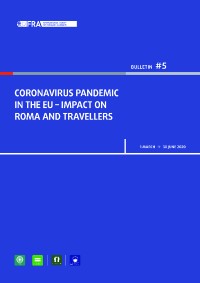https://tandis.odihr.pl/handle/20.500.12389/22646
| DC Field | Value | |
|---|---|---|
| Country Coverage | Belgium | |
| Country Coverage | Bulgaria | |
| Country Coverage | Croatia | |
| Country Coverage | Czech Republic | |
| Country Coverage | France | |
| Country Coverage | Greece | |
| Country Coverage | Hungary | |
| Country Coverage | Ireland | |
| Country Coverage | Italy | |
| Country Coverage | Netherlands | |
| Country Coverage | Portugal | |
| Country Coverage | Romania | |
| Country Coverage | Slovakia | |
| Country Coverage | Spain | |
| Country Coverage | Sweden | |
| Accessioned Date | 2020-09-29T12:41:02Z | |
| Availability Date | 2020-09-29T12:41:02Z | |
| Issue Date | 2020-09-28 | |
| ISBN | 9789294743824 | |
| ISBN | 9789294743916 | |
| ???metadata.dc.identifier.other??? | 10.2811/978921 | |
| ???metadata.dc.identifier.other??? | 10.2811/06170 | |
| URI | http://hdl.handle.net/20.500.12389/22646 | |
| Abstract | "Overview Commentary on the COVID-19 outbreak often describes the virus as a great equaliser, given that it does not discriminate based on class, race or other grounds. But a closer look makes clear that the virus has ravaged some communities more than others. Often living in substandard and overcrowded housing conditions, Roma and Travellers face an increased risk of contracting COVID-19. As our bulletin shows, they are also disproportionately affected by measures taken to contain the virus. In the 15 EU Member States covered in this bulletin, lockdowns kept many Roma and Travellers from working as street vendors and travelling traders, and from engaging in diverse forms of precarious work. They have also faced difficulties in claiming support and benefits available to workers in the formal labour market. As a result, poverty is on the rise – and the real risk of hunger looms. Meanwhile, limited access to water, electricity and sanitation creates serious health concerns – which are exacerbated by various barriers to accessing health services. The lack of basic infrastructure is an issue for entire communities, but the younger generation faces another hurdle: without internet access and appropriate IT equipment, they risk falling even further behind at school. Amidst these difficult realities, the persistent scourge of anti-Gypsyism remains everpresent, with hateful rhetoric on the rise in many countries. Tackling these challenges is no easy undertaking. Yet one thing is certain: to succeed, efforts must support local authorities to strengthen their capacity or expertise in social inclusion work, and involve Roma and Travellers themselves – both during the COVID-19 crisis and beyond. In this report: - Lockdowns affect Roma and Travellers disproportionately - Pandemic widens gap in education - Impact of measures to tackle pandemic on employment - Increased poverty and risk of malnutrition - Poor access to healthcare services - Housing deprivation, lack of access to clean water and sanitation - Civil society contribution - Anti-Gypsyism and hate speech persist during pandemic - Lessons learnt from first wave of pandemic" | |
| Format | ||
| Language | en | |
| Publisher | EU FRA | |
| Subject Keywords | racism and xenophobia | |
| Subject Keywords | Roma and Sinti | |
| Subject Keywords | civil society | |
| Subject Keywords | anti-discrimination | |
| Subject Keywords | equality | |
| Subject Keywords | access to health services | |
| Title | Coronavirus pandemic in the EU – impact on Roma and Travellers (Bulletin 5) | |
| Material Type | thematic report | |
| Corporate Authors | European Union Agency for Fundamental Rights (FRA) | |
| Key Issues | Racism and xenophobia | |
| Key Issues | Roma, Sinti and Travellers | |
| Edition | 1 | |
| Physical Description | 32 p. | |
| URL more information | https://fra.europa.eu/en/publication/2020/covid19-rights-impact-september-1#TabPubOverview0 | |
| See Also | returnees | |
| Fulltext | With Fulltext | |
| Fulltext Grant | open | |
| Related Country | OSCE region | |
| Related Country | UN region | |
| Related Country | EU region (pre-2021) | |
| Related Country | CoE region | |
| Related Country | EU region (post-2020) | |
| Related Country | OSCE region | |
| Related Country | UN region | |
| Related Country | EU region (pre-2021) | |
| Related Country | CoE region | |
| Related Country | EU region (post-2020) | |
| Related Country | OSCE region | |
| Related Country | UN region | |
| Related Country | EU region (pre-2021) | |
| Related Country | CoE region | |
| Related Country | EU region (post-2020) | |
| Related Country | OSCE region | |
| Related Country | UN region | |
| Related Country | EU region (pre-2021) | |
| Related Country | CoE region | |
| Related Country | EU region (post-2020) | |
| Related Country | OSCE region | |
| Related Country | UN region | |
| Related Country | EU region (pre-2021) | |
| Related Country | CoE region | |
| Related Country | EU region (post-2020) | |
| Related Country | OSCE region | |
| Related Country | UN region | |
| Related Country | EU region (pre-2021) | |
| Related Country | CoE region | |
| Related Country | EU region (post-2020) | |
| Related Country | OSCE region | |
| Related Country | UN region | |
| Related Country | EU region (pre-2021) | |
| Related Country | CoE region | |
| Related Country | EU region (post-2020) | |
| Related Country | OSCE region | |
| Related Country | UN region | |
| Related Country | EU region (pre-2021) | |
| Related Country | CoE region | |
| Related Country | EU region (post-2020) | |
| Related Country | OSCE region | |
| Related Country | UN region | |
| Related Country | EU region (pre-2021) | |
| Related Country | CoE region | |
| Related Country | EU region (post-2020) | |
| Related Country | OSCE region | |
| Related Country | UN region | |
| Related Country | EU region (pre-2021) | |
| Related Country | CoE region | |
| Related Country | EU region (post-2020) | |
| Related Country | OSCE region | |
| Related Country | UN region | |
| Related Country | EU region (pre-2021) | |
| Related Country | CoE region | |
| Related Country | EU region (post-2020) | |
| Related Country | OSCE region | |
| Related Country | UN region | |
| Related Country | EU region (pre-2021) | |
| Related Country | CoE region | |
| Related Country | EU region (post-2020) | |
| Related Country | OSCE region | |
| Related Country | UN region | |
| Related Country | EU region (pre-2021) | |
| Related Country | CoE region | |
| Related Country | EU region (post-2020) | |
| Related Country | OSCE region | |
| Related Country | UN region | |
| Related Country | EU region (pre-2021) | |
| Related Country | CoE region | |
| Related Country | EU region (post-2020) | |
| Related Country | OSCE region | |
| Related Country | UN region | |
| Related Country | EU region (pre-2021) | |
| Related Country | CoE region | |
| Related Country | EU region (post-2020) | |
| Appears in Collections: | test collection again Tolerance and Non-Discrimination in the Context of COVID-19 Documents | |
Files in This Item:
| File | Description | Size | Format | |
|---|---|---|---|---|
| 22646_EN.pdf | English | 1.83 MB | Adobe PDF |  |

